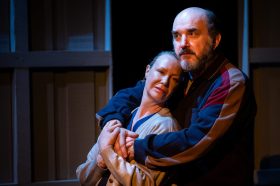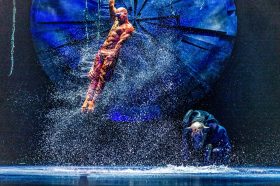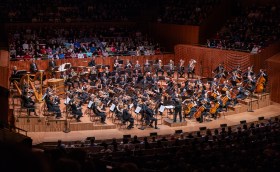Matt Crook in Theatre Republic’s Lines. Photo credit: Olivia Zanchetta Design.
Certain generalisations can be made about Australian theatre criticism, but it’s truer to say that no two state or city critical cultures are alike. As with the proverbial curate’s egg, all contain both good and bad, though in differing proportions, and for varying reasons. Adelaide, a city with a population many times smaller than its eastern state counterparts, has long held a reputation for a criticism that is insular, truculent, and reactionary. More than one Artistic Director, usually the kind of interloper Adelaideans are inclined to regard with suspicion, has virtually been driven out of their job, if not the city itself, by the belligerence of its critics.
It’s a tradition tied to many things: the city’s festival mentality, which has tended to see four weeks of intense cultural activity across February and March offset by eleven months of small-town inertia; the unusual prominence of amateur performance (essentially a historical quirk), which connects to an odd, and fundamentally conservative, mistrust of professional, and especially innovative, work; and the old boy networks that continue to circumscribe too much of Adelaide’s arts and culture.
Mainly, though, I think the problem has been the stubborn endurance of an old-fashioned, adversarial view of criticism – a product of the vanishing world of newspaper publishing – in which artists and critics are held to be diametrically opposed rather than jointly responsible for the creation of culture. In this narrowing view, which I once hoped the internet would liberate us all from but still dominates in the mainstream media, there is little to no room for insight, context, or discussion. Judgement rather than nuance is the order of the day, and the importance of criticism’s role as a descriptive, and hopefully evocative, record of the ephemeral is subordinated to that of consumer guide (five stars!) with or without supporting arguments.
In her essay ‘The Critical Gap’, Alison Croggon wrote:
The fiction of “objective” arts criticism has given way to a more complicated idea of criticism as a discipline that complements and stimulates other activities and means of cultural production, and which is self-reflexive and self-aware. [Companies recognise] that critique is much more than brute assessment, but rather a public engagement which can catalyse audiences as well as artists.
It was with something like this in mind that, in October, I spent around 20 hours with Adelaide independent theatre company Theatre Republic during rehearsals for their debut production Lines. Drawing on the so-called embedded criticism of young British critics Maddy Costa, Andrew Haydon, and others, my intention was to explore and describe the artistic process, to find a language for talking about theatre outside of the closed, end product-focussed judgments of mainstream reviewing. It was an experiment – unusual, but hardly unique (I’ve found precedents in Australia going back two decades) – that proved too much for some in Adelaide’s old critical guard.
Peter Goers, once the self-styled ‘Critic That Ate Adelaide’ but who hasn’t been a practicing reviewer for 20 years, fulminated against the resultant article in a speech given this month at the Adelaide Critics Circle Awards, and again in a recent op-ed for the Sunday Mail. It’s galling enough that in both instances Goers quoted lines out of context with the implicit aim of ridiculing the whole idea of embedded criticism (about which, in any case, I remain ambivalent, as the article made clear). It’s worse, and not a little ironic, that an arts journalist so incurious about the workings of professional rehearsal rooms should be so unfamiliar with what actually goes on in them.
For Goers, ‘the critic can never be part of the creation of art. Living playwrights attending rehearsals are bad enough and generally get in the way.’ It is, on the contrary, standard practice these days for playwrights to attend rehearsals, and thank goodness – their presence at the heart of the creative process, though often imperfectly managed in practice, is critical to the development of new work. Reviewers, too, have long had their place in the creation of art, from critic-practitioners like Kenneth Tynan and George Bernard Shaw, to the first dramaturgs who were generally critics entrenched in theatre companies. It’s hard to even know where to start with a claim as self-evidently ludicrous as ‘one reason Shakespeare is so great is that he’s been dead for 400 years and can’t interfere’.
I don’t propose we replace traditional reviews – which have been, and I suspect always will be, my bread and butter – with reports from the rehearsal room, or other formally adventurous modes of criticism (for the record, I remain sceptical of reviews written in emojis and the like). As I’ve written before, I think it reflects common sense rather than cultural conservatism to argue that the forms we already have will, for the most part, do for the informed and informing reviews necessary for a healthy critical culture. I do, however, believe that theatre-makers, audiences, and the reading public more generally have an appetite for writing that demystifies the making of professional theatre. As performance continues its increasingly process-driven turn, and a decline in long-form criticism erodes audience literacy, such writing will if anything, I think, become even more sought after.
According to Croggon:
When a palpable gap exists between the ideas and ambitions driving a work and the responses that shape its public perception, criticism isn’t doing its job well, by any of the interests it’s supposedly for: readers, audiences, artists, the culture, the art itself. It is this, more than shrinking space, financial sustainability, and so on, that bedevils theatre criticism in Australia.
In Adelaide, where unpaid criticism dominates and the prevailing view at the city’s only daily newspaper is that critics require no expertise – the paper, while assiduously covering amateur theatre, routinely sends its business, real estate, and sports reporters to review even Festival shows – this gap is surely wider than in Sydney, Brisbane, or Croggon’s Melbourne.
Where once the city’s critical culture was known for its antagonism, today it feels, if anything, defined by the opposite problem – a seeming reluctance to call out second-rate work when we see it. It’s as though, shocked by our own capacity to tear down, we have retreated into a kind of complacency. More often than not the reviews I read here, even those by our most thoughtful critics, take the path of least resistance, smoothly though probably unconsciously integrating themselves more with the machinery of public relations than criticism.
I don’t think the solution to this is a return to Goers-style bellicosity, which, for all its rhetorical fireworks, tends to the conservative and is, in the end, just as boring as the anodyne. In themselves, experiments in embedded criticism, or other comparatively novel forms, won’t fix things either. But I do think anything that seeks to expand the kinds of discourse we can have around theatre – to, in Croggon’s words, provide ‘a hinge between the artwork and its audience, opening the doors to possibilities of understanding’ – should be welcomed.
Perhaps, as a start, the Adelaide Critics Circle, rather than continuing to provide a platform for criticism at its most close-minded, could take a leaf out of the book of their British counterpart and host a series of workshops on the various theatre crafts, such as sound, lighting and set design, to give its members the tools to better describe and evaluate the work they see.
Sadly, as things stand, the showing of such enterprise is all too difficult to imagine.





